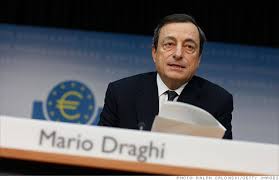By Jana Randow & Stefan Riecher - Dec 18, 2012 4:00 AM GMT+0400
 A commitment in July to preserve the euro at any cost and the establishment of a single banking supervisor have improved financial-market sentiment, Draghi said in Brussels yesterday. One priority for 2013 is now to create a single resolution mechanism to complete Europe’s banking union, he said.
A commitment in July to preserve the euro at any cost and the establishment of a single banking supervisor have improved financial-market sentiment, Draghi said in Brussels yesterday. One priority for 2013 is now to create a single resolution mechanism to complete Europe’s banking union, he said.
European Central Bank President Mario Draghi said ECB policies and governance reforms in the euro area have revived confidence that will help foster a gradual economic recovery in the second half of next year.
“The impression that one has of this year, at least of the second part of this year, is of a gradual improvement in financing conditions which is one of the reasons why we foresee a beginning of a recovery in the second part of next year,” Draghi said in testimony at the European Parliament’s Economic and Monetary Affairs Committee. Still, “the medium-term outlook for economic activity remains challenging.”
The Frankfurt-based ECB cut its economic forecasts earlier this month, predicting the 17-nation region will contract 0.5 percent this year and 0.3 percent in 2013. The Governing Council kept its benchmark interest rate at a record low of 0.75 percent, even though a majority of policy makers were open to easing borrowing costs, according to three officials speaking on condition of anonymity.
ECB Executive Board member Yves Mersch told German newspaper Frankfurter Allgemeine Zeitung in an interview to be published today that he doesn’t “quite understand” the discussion about lower interest rates because non-standard measures have become the primary policy tools.
Banking Oversight
Draghi said that monetary policy will remain independent from banking oversight when the ECB takes over supervisory powers over the region’s 6,000 lenders.
European Union finance ministers last week set a March 2014 target date, 12 months after the legal framework is planned to be in place, and Financial Services Commissioner Michel Barniersaid about 200 banks should automatically qualify for direct ECB supervision.
Draghi said “the numbers would speak for something in the order of 130, 150 of so-called direct supervision and the rest indirect supervision.”
The supervisory mechanism “has all the powers to be effective; the challenge now is really in its implementation,” he said. “It’s important to do it soon but it’s even more important to do it well.”
Draghi urged European lawmakers to create a single resolution mechanism alongside the single supervisor.
“The aim of resolution is to deal with non-viable banks through measures that include their orderly winding down and closure while preserving financial stability,” Draghi said. “Such a mechanism will make it possible for banks to fail in an orderly manner” and “one of the key decisions to take is whether creditors are going to be bailed in or not, whether shareholders are going to be wiped out or not.”
To contact the reporters on this story: Jana Randow in Frankfurt at jrandow@bloomberg.net;
Stefan Riecher in Frankfurt at sriecher@bloomberg.net
To contact the editor responsible for this story: Craig Stirling at cstirling1@bloomberg.net